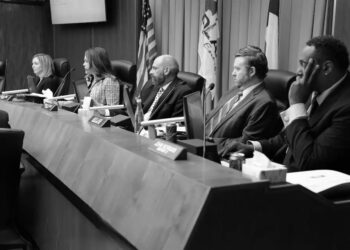Can advances in computing help our government better do its job? Across the United States, public officials are betting it can. As they try to incorporate predictive analytics and technology into their operations, each is needing to consider how these non-human actors will be regulated, funded, and made transparent to the public.
We looked at five cities and the steps and policies they’ve considered in their adoption of algorithmic tools.
New York City, New York: Introducing oversight during implementation
New York City made big headlines with the announcement over a year ago that it would be developing an Automated Decision Systems Task Force to look at existing technologies being used by the City.
“The establishment of the Automated Decision Systems Task Force is an important first step towards greater transparency and equity in our use of technology,” said Mayor Bill de Blasio.
A hotbed of developing AI offerings, the city employs technologies including ShotSpotter gunshot detection and congestion pricing on its toll roads, among an unknown number of other relevant systems. In meetings of the Task Force so far, participants have emphasized the need to inventory and make explainable each of the systems in use.
First, though, the group has needed to focus on identifying what qualifies as an algorithm, a question with which local officials and accountability groups will need to grapple; for now, regulations in many areas are being limited to specific technologies and use cases, rather than the network of possible automated systems. For its purposes, the New York City group has released a checklist of terms and categories that will be relevant to the group’s work.
Columbus, Ohio: Grants drive experimental implementations
Columbus, Ohio was one of seven finalists – alongside Austin, Denver, Kansas City, Pittsburgh, Portland, and San Francisco – for one of the first smart city grant programs hosted by the U.S. Department of Transportation. That award came with $50 million and more than 100 partners cultivated by the city.
Much of that initiative has been communicated through the city’s Smart Columbus website, which also features a collection of open datasets and heavily emphasizes the importance of local, real-time mobility data to developing more efficient transportation systems.
The use of in-the-moment location data is increasingly becoming a part of transportation plans nationwide, sparking concerns about privacy for individuals who may not realize that their locations are being tracked or logged.
Similar privacy concerns spurred technology privacy advocates Electronic Frontier Foundation to file a lawsuit against AT&T last week for its sale of consumer location data, but they have yet to affect the use of real-time location data used in traffic planning, as in the Replica program created by Google’s Sidewalk Labs, which has begun partnerships in Columbus and Portland, Oregon.
Los Angeles, California: Jumping into the deep end
Los Angeles’ employment of algorithms has been one of the widest in America. In addition to its use in transportation, including automated traffic sensors and dynamic tolling, the city and county have been eager to adopt law enforcement technologies like automated license plate readers and PredPol, whose efficacy a recent audit found could not be determined. The West Coast’s largest city quietly entered into an agreement with Axon to be its official AI partner, which includes an agreement to extensively share data with the law enforcement company. The surveillance technologies don’t require specific review by the city council, though legislators in California are currently considering statewide regulation of the technology.
Somerville, Massachusetts: Pressing pause to study the issue
Just north of Boston, the City of Somerville is a community of immigrants, students, blue collar workers, and a growing population of technology workers. It recently took the step of banning facial recognition technology, part of a conversation in the City Council that occurred concurrently with similar talks in San Francisco that ultimately led to restrictions on facial recognition and surveillance technologies.
“There are two issues here. One issue is the existing technologies – there are absolutely no regulations or guidelines for accuracy, for biases, and for democratic oversight. Who can access these databases and under what circumstances?” said Ben Ewan-Campen, the city councilor that put forward the Somerville ordinance.
“And there’s also this issue – even assuming this technology is perfect, is this a power that we want to give to our government, and, if so, under what circumstances? I think neither of those conversations have happened, and yet, we’re seeing it rolled out. And in my opinion, this is the thin edge of the wedge of law enforcement technologies that are brought to market with really no oversight, no transparency, no public conversation around it.”
Somerville’s ordinance does not offer exemptions for law enforcement use, and Ewan-Campen says the city council is also working on a surveillance oversight ordinance that would set transparency standards for all surveillance technologies used by the city.
Spokane, Washington: Discovering the true cost of data
Spokane, Washington had an ambitious plan to develop a pre-trial risk assessment tool, winning a grant from the MacArthur Foundation in order to fund the work. But after three years and millions of dollars, the city found that the necessary data points and upkeep were going to require more money than the city would be able to invest on its own, and the town tossed development of the tool, which had been done in collaboration with the University of Washington.
Soon thereafter, Spokane decided to adopt another pretrial tool, the Arnold Foundation’s PSA, with an additional MacArthur grant, continuing the goal of using the tool to address pretrial detention rates.
“In terms of how community engagement and data collection and analysis relate, I think it’s incredibly important for individuals within the system to understand how the system is operating and how one person’s decision, for instance a prosecutor’s decision, affects the judge’s decision and so on,” said Maggie Yates.
“But it’s also really important with developing transparency with the community and making sure that the community also understands what’s happening within the criminal justice system and across the criminal justice system and also allowing them to understand and see where our initiatives are occurring and what impacts, if any, they’re having.”
This article is reprinted under a Creative Commons Attribution 4.0 International License.









